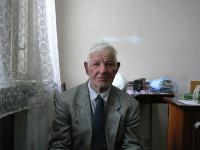So this is what you did after... so you were in Stoenesti, Salcia, at Măcin
Yes, that’s right.
In Tulcea county.
Yes.
And in Periprava as well.
Yes.
And, uh, how long did you spend... So you were arrested in January ’59 and released in ’64.
Yes, I was.
11th of April 1964.
Yes, April ’64.
What did they give you to eat in prison? What sort of food? In Craiova?
In Craiova they’d give us... like, military rations, something like that.
So worse food than the soldiers would get.
How’s that?
Worse food?
Well, now food... it was of course the worst, but there was no bread... only about 100 grams (3.5 oz), that was all. 100g of bread per day in 24 hours. Well, what to say... the tea, the food... I survived. Thank God I was healthy and even now I’m healthy, for I didn’t indulge.
And, uh, how whas the food in Stoeneşti or in Salcia?
At work there it was a bit better than in... in the questionings.
So you did labour in the camps? In the labour camps in the Denube Delta, that’s where you worked?
Yes, I worked there, yes.
What sort of work did you do there?
I was building this dam, and I was carrying material by wheelbarrow up to 150 meters, on a plank, and the dam was 30m wide at the bottom and 15 at the top.
Anything else... so this was at... where was this? Where did you do this work?
Umm... in Balta, in Brăila.
So in Brăila.
Yes, there. And when I was sent to Tulcea there was this committee that came and... they chose among us who should go to the reed plots.
What was the labour like on the reed plots?
Just like... equally bad as in...
What were you doing?
...as in prison I mean, but it was...
What were you doing on the reed plots? Where were these plots?
Well I was there first for... umm, the work in the fields and they then chose us who... I was with the intellectuals, they didn’t put me with the workers, they was saying we’d fill their heads with stuff, or something like that. So they gave me to a... sent me to a farm there which was raising horses. And I was there all winter, there was also priest Vlădoianu there.
Have you met anyone else... anyone special... in the 4 years of detention or... excuse me, the 5 years?
I met Fulga, the general, or whatever he was, I met him at labour there in Brăila and from here from Târgu Jiu there was also my cousin, Munteanu Şerban, a priest. And there was another one, Roşca, also a priest, and that’s who they put me with, as I was, sort of...
Manualy skilled?
They put me in charge of a group, 10 people. For giving account, and keeping order among those intellectuals. And I also met other priests from Transylvania, catholic priests, others. They kind of picked up the priests, like that. I was honest there, had no quarrels with anyone. What we was ordered, that’s what we did. I kept the records of the guards’s rotation, and for the hard labour... when they was asking for men for work for the military, to peel potatoes. I mean I was keeping things in some kind of an order, among us there. And with the measurements, I was doing those, and the commander oversaw all that. I made do with... my hands.

